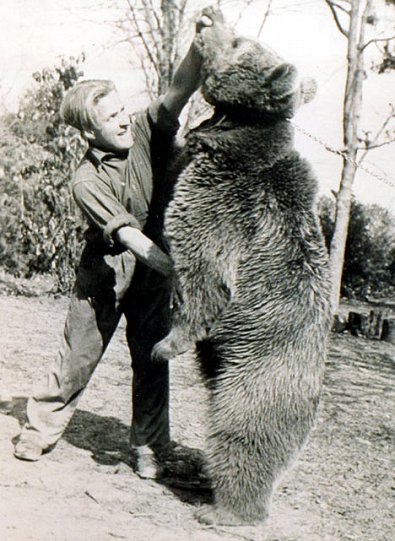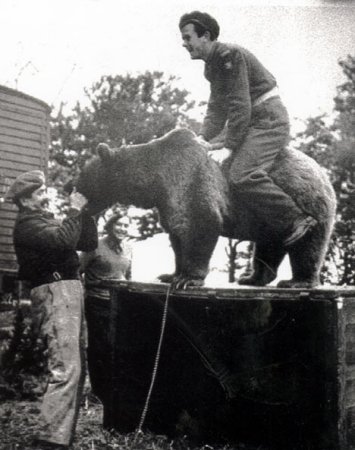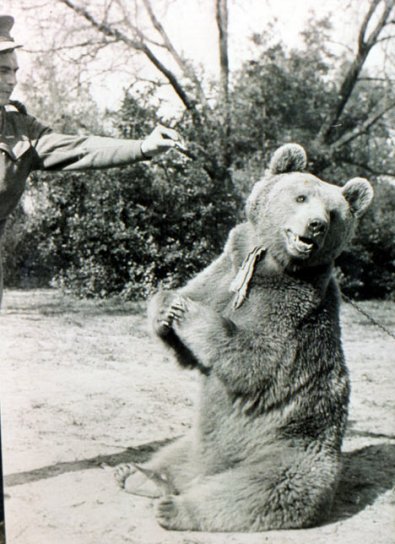The hero bear who went to war (and loved a smoke and a beer)
Daily Mail .co.uk

Voytek the ‘soldier bear’ was a secret weapon used by the Polish troops in World War II
Like any soldier, he loved to relax with a cigarette and a bottle of beer when out of the firing line.
But in the heat of battle, he became an inspiring figure – bravely passing ammunition along to supply the guns.
All the men in the Second Polish Transport Company agreed that the recruit they called Voytek was the perfect comrade.
As for Voytek, he was just happy to be part of the unit… ever ready to lend a helping paw.
The 250lb brown bear, standing more than 6ft tall, was possibly the most remarkable combatant of the Second World War, seeing action amid the hell of Monte Cassino in Italy.
After the war, he and his fellow troops were billeted in Scotland and he lived out his days in Edinburgh Zoo, dying in 1963.
Now a campaign is under way to build a permanent memorial to the remarkable animal who fought so valiantly for the Allied forces.
Voytek was just a tiny bundle of fur when he was discovered wandering in the hills of Iran by the Second Polish Transport Company when they were driving through Persia towards Palestine in 1943.
Having lost his mother, he attached himself to the men, who fed him on condensed milk and gave him an old washing up bowl to sleep in.
Little wonder that the troops adopted him, and soon found he could be a useful addition. As he grew he was trained to carry heavy mortar rounds.
Story has it that in the heat of summer he learned to work the shower, and used it so often that the Nissen hut had to be locked to prevent him exhausting the water supply.
On one occasion, Voytek was delighted to find the door ajar. Entering the bear discovered a cowering Arab who had come to spy out the lie of the land for a raiding party, intending to steal all the weapons and ammunition.
The spy confessed all, the raiding party were rounded up, and Voytek became a hero. He was given two bottles of beer and allowed to spend all morning splashing happily in the bath hut.
When Polish forces were deployed to Europe the only way to take the bear with them was to enlist him.
He was given a name, rank and number and when the Polish II Corps arrived in Italy in 1944 to supply their own and British frontline soldiers with desperately needed ammunition and food, Voytek was their secret weapon.
Despite almost constant heavy fire, Voytek travelled in the munitions trucks, his head hanging out of the window.
He helped the supply side by cradling 25lb shells or boxes of ammunition in his arms and passing them down the line.
Off-duty, he loved nothing more than a bottle of beer, a cigarette and to wrestle with the men – in between raids on the cookhouse.
By the end of the war, Voytek had become a symbol of ursine courage, but his country was under Soviet domination, so he travelled with other Polish troops to Scotland and the Berwickshire village of Hutton.
Soldiers who were stationed with him say that he was easy to get along with.
Voytek soon took on many human characteristics, crying when left alone and covering his eyes with his paws if chastised.
As he grew, he became a key member of the unit, being trained to carry mortar shells.
In the heat of summer, he reportedly learned to work the shower of the unit’s bath hut.
On one occasion, Voytek was delighted to find the door ajar – and discovered an Arab who was spying for a raiding party.
The intruder confessed all, and the enemy were rounded up. Hailed a hero, Voytek was given two bottles of beer and allowed to spend all morning splashing happily in the bath hut.
When the Poles were deployed to Italy in 1944 to supply Allied troops with desperately-needed food and ammunition, the only way to take their furry friend with them was to officially enlist him – so he was given a name, rank and number.
As the bitter battle for the monastery of Monte Cassino was fought, the bear travelled in the munitions trucks, his head hanging out of the window, ignoring almost constant shellfire.
Cradling 25lb shells or boxes of ammunition in his arms, he would effortlessly pass them down the line. Off-duty, he loved a bottle of beer, a cigarette and to wrestle with the men – in between raids on the cookhouse.

Voytek was found by soldiers when he was just a cub but he soon became attached to the troops
At the end of the war, the transport company was stationed in the village of Hutton, Berwickshire, where Voytek became a local legend.
“He was like a big dog, no one was scared of him,” said Polish veteran Augustyn Karolewski, 82, who still lives near the site of the camp.
“He liked a cigarette, he liked a bottle of beer – he drank a bottle of beer like any man.” When the troops were demobilised, Voytek moved to Edinburgh Zoo.
Mr Karolewski went to see him and found he still responded to the Polish language.
“As soon as I mentioned his name, he would sit on his backside and shake his head, wanting a cigarette.
“It wasn’t easy to throw a cigarette to him – I made several attempts until he got one.”
Teacher Garry Paulin has written a book, Voytek – The Soldier Bear, which will be published next month.
Aileen Orr, who lives in Hutton, is campaigning for a memorial. “The story is totally amazing and it would be good if we could have some memorial in Scotland, perhaps at Holyrood, to celebrate the bear’s life,” she said.
And like any other combatant, he is even said to have had an official name, rank and number.
Now a campaign is underway to build a permanent British memorial to the remarkable bear who fought so valiantly for the Allied forces and lived out his final days in Edinburgh Zoo.
Polish veteran Augustyn Karolewski, 82, who still lives near the site of the camp in Berwickshire, said: ‘He was like a big dog, no-one was scared of him.
“He liked a cigarette, he liked a bottle of beer – he drank a bottle of beer like any man.”
When the troops were demobilised, Voytek spent his last days at Edinburgh Zoo, where died in 1963.
Mr Karolewski went back to see him on a couple of occasions and found he still responded to the Polish language.
He explained: “I went to Edinburgh Zoo once or twice when Voytek was there.
“As soon as I mentioned his name he would sit on his backside and shake his head wanting a cigarette. “It wasn’t easy to throw a cigarette to him – all the attempts I made until he eventually got one.”
Teacher Garry Paulin has written a book Voytek -The Soldier Bear, which will be published next month. Campaigner Aileen Orr, who lives in the village of Hutton, said she first heard about Voytek as a child from her grandfather who served with the King’s Own Scottish Borderers.
She said: “I thought he had made it up to be quite honest but it was only when I got married and came here that I knew in fact he was here, Voytek was here.
“It is just amazing, the story is totally amazing and it would be good if we could have some memorial in Scotland, perhaps at Holyrood, to celebrate the bear’s life.”

Voytek in the zoo: He soldiered on there until 1963

Wild Thing’s comment……..
You know I love, LOVE, this story. I also loved how Polish veteran Augustyn Karolewski went back to the zoo to visit Voytek.
 …Thank you Tom for sending me this story. I am smiling so big reading about this bear and the soldiers.
…Thank you Tom for sending me this story. I am smiling so big reading about this bear and the soldiers.

How sweet and how wonderful of the Polish troops.
To save a young cub’s life like that and he paid them back many times over.
Yes, there should be a memorial and maybe a movie about Voytek. (I love that name!) If they can do a movie about Balto, the dog who got the medicine through during a scarlet fever epidemic, they can certainly do one about Voytek. (only get it right!)
This was the first time I had heard about this bear with the Polish troops. I have read extensively about the Battle of Monte Casino and never run across it before. Very cute story.
It is neat the bear got to live out his life in Great Britain. What this story doesn’t say is that large numbers of Polish soldiers stayed in Western Europe rather than go back to Poland which came under Russian domination. It looks like these Polish troops kept Voytek supplied with cigarettes.
Thanks WT. Another wonderful story and quite touching. I have nothing but great respect for the bears, having been up close to one or two in the wild.
We have a wildlife farm at Sequim, Wa. where there are Brown Bear on the loose kept separate from the visitors by an electric fence, it’s always fun to take along a loaf or so of bread and feed them. No black bears are treated this way since they are very unpredictable and never ‘domesticate’ like a brown bear. But even under tame circumstances, never treat one as a safe animal to get near. I’d be willing to bet some of those Poles got the number 2 award in the wrestling matches. Just remember they are all wild and unpredictable and never underestimate their intelligence or cunning. Thank you Tom.
Bear’s rule!
“Arabs taste like chicken?” – Da Bears! GOD bless President Theodore Roosevelt for making ‘TEDDY’ famous in the good old days!!
Lynn, I love the name too, I am so glad you got to read the story.
Tomo your right, they stayed in England. I was surprised about that and didn’t know some of them did that.
Jack that is interesting about Sequim. As I was reading this story I thought once it had grown it would not have stayed with the men, but this one must have really unusual with his good nature. Very, very unusual bear for sure.
Les, giggle…..yes they do. heh heh At least at this blog they do. hahahahhaa
Darth, LMAO……””Arabs taste like chicken?”
We need some bears like this I think.
“Hey… Don’t FAHGETABOUT good ole Yogi Bear and Boo Boo!” – Picknic Basket Forest Mr. Forest Ranger Sir 2008?
Thank you for running this story about Soldier Bear. There now has been world wide interest in him, at last. Maybe Hollywood next? But we believe we will create a very fitting celebration of his life in Scotland. Anyone with information about him please contact me. Or any former troops who were based at Winfield Air Field, Charterhall or Sunwick in Berwickshire Scotland in wartime.
Aileen Orr